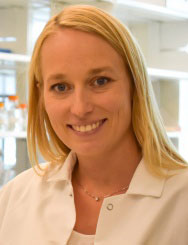2018 A Breath of Hope Fellow
Dr. Stefani Spranger of the Koch Institute for Integrative Cancer Research at the Massachusetts Institute of Technology
A Breath of Hope Lung Foundation (ABOH) is pleased to introduce the winner of our 2018 research fellowship, Dr. Stefani Spranger of the Massachusetts Institute of Technology (MIT).
The research project funded by A Breath of Hope Lung Foundation is seeking to tackle a long-standing question on whether the heterogeneity of a tumor is impacting its immune response. Although often perceived as one disease, any cancer lesion is comprised of millions of tumor cells. While some tumor cells seem similar to others, they may be very different in their appearance to the immune system. This phenomenon of high intra-tumor heterogeneity is particularly common in lung cancer. Despite us knowing about the heterogeneity, we currently have no mechanistic understanding about its impact on anti-tumor immunity. Understanding this interplay will help find rational and potent combination treatments with cancer immunotherapy, a relatively new treatment modality activating the patients’ own immune system to fight cancer.
We offer our congratulations to Dr. Spranger for the incredible work she is doing and the potential impact it brings to the lung cancer field. We couldn’t be prouder to be supporting this young scientist and look forward to reporting back on her progress during her two years as an ABOH fellow!
Dr. Stefani Spranger
 Dr. Spranger pursued her scientific training at Ludwig-Maximillians-Universität (LMU) in Munich, Germany, first as an undergraduate in biology and then completing a Ph.D. in immunology. Her Ph.D. work, under the supervision of Prof. Dolores Schendel at the Helmholtz-Zentrum Munich, focused on the iidentification of specific T cell responses against acute myeloid leukemia. For her postdoctoral training she joined the group of Tom Gajewski at the University of Chicago as a postdoctoral fellow, supported by the German Research Foundation as well as the Cancer Research Institute. Her postdoctoral work focused on T cell-exclusion from the tumor microenvironment in malignant melanoma. In 2017, she moved to her current position as assistant professor at the Koch Institute for Integrative Cancer Research at the Massachusetts Institute of Technology where she was elected to the Society for Immunotherapy of Cancer (SITC) in 2019. Her work seeks to elucidate the mechanisms and pathways underlying the interaction between the immune system and cancer using mouse models that recapitulate the co-evolution of tumor progression and the anti-tumor immune response. This research aims to shed light on new or improved immunotherapies for human cancers.
Dr. Spranger pursued her scientific training at Ludwig-Maximillians-Universität (LMU) in Munich, Germany, first as an undergraduate in biology and then completing a Ph.D. in immunology. Her Ph.D. work, under the supervision of Prof. Dolores Schendel at the Helmholtz-Zentrum Munich, focused on the iidentification of specific T cell responses against acute myeloid leukemia. For her postdoctoral training she joined the group of Tom Gajewski at the University of Chicago as a postdoctoral fellow, supported by the German Research Foundation as well as the Cancer Research Institute. Her postdoctoral work focused on T cell-exclusion from the tumor microenvironment in malignant melanoma. In 2017, she moved to her current position as assistant professor at the Koch Institute for Integrative Cancer Research at the Massachusetts Institute of Technology where she was elected to the Society for Immunotherapy of Cancer (SITC) in 2019. Her work seeks to elucidate the mechanisms and pathways underlying the interaction between the immune system and cancer using mouse models that recapitulate the co-evolution of tumor progression and the anti-tumor immune response. This research aims to shed light on new or improved immunotherapies for human cancers.
Lay Progress Report: Lack of CD8+ T cell effector differentiation during priming mediates checkpoint blockade resistance in non-small cell lung cancer – Dr. Stefani Spranger
Lay Progress Report: Whether the degree of intra-tumor heterogeneity affects a tumor-specific immune response – Dr. Stefani Spranger
December 2019
Anti-tumor immune responses are critical for the response to highly effective immunotherapeutic interventions. However, only a fraction of lung cancer patients are currently responding to this treatment. Clinical studies have provided evidence that expression patterns of specific molecules, known as neo-antigens, could determine how well a given patient is responding to therapy. In order to overcome this therapeutic hurdle, we have to mechanistically understand why tumors with non-uniform neo-antigen expression would have weaker immune responses.
To investigate immune responses to uniform or non-uniform neo-antigen patterns, we engineered a tumor model which allows us the defined manipulation of those patterns. Consistent with the clinical observations, we detected that indeed, uniform patterns were associated with stronger tumor control. However, to our surprise, we did detect similar magnitude in immune responses against non-uniformly patterned tumors – though the response seems to be delayed.
Next we will investigate how we can therapeutically enhance tumor control by investigating which factors mediate the accelerated immune response in uniform tumors.
We would like to thank A Breath of Hope Lung Foundation and all of their donors for making this research possible. Understanding resistance to immunotherapy will increase the number of patients able to benefit long-term and reduce mortality.

